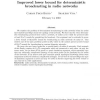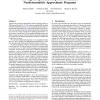169 search results - page 5 / 34 » Which Languages Have 4-Round Zero-Knowledge Proofs |
TCC
2009
Springer
14 years 8 months ago
2009
Springer
The concept of witness-hiding suggested by Feige and Shamir is a natural relaxation of zero-knowledge. In this paper we identify languages and distributions for which many known co...
ITP
2010
13 years 11 months ago
2010
CertiCrypt is a general framework to certify the security of cryptographic primitives in the Coq proof assistant. CertiCrypt adopts the code-based paradigm, in which the statement ...
ASIACRYPT
2006
Springer
13 years 11 months ago
2006
Springer
Non-interactive zero-knowledge proofs play an essential role in many cryptographic protocols. We suggest several NIZK proof systems based on prime order groups with a bilinear map...
CORR
2008
Springer
13 years 7 months ago
2008
Springer
We consider the problem of deterministic broadcasting in radio networks when the nodes have limited knowledge about the topology of the network. We show that for every determinist...
PLDI
2012
ACM
11 years 10 months ago
2012
ACM
Approximate program transformations such as skipping tasks [29, 30], loop perforation [21, 22, 35], reduction sampling [38], multiple selectable implementations [3, 4, 16, 38], dy...


